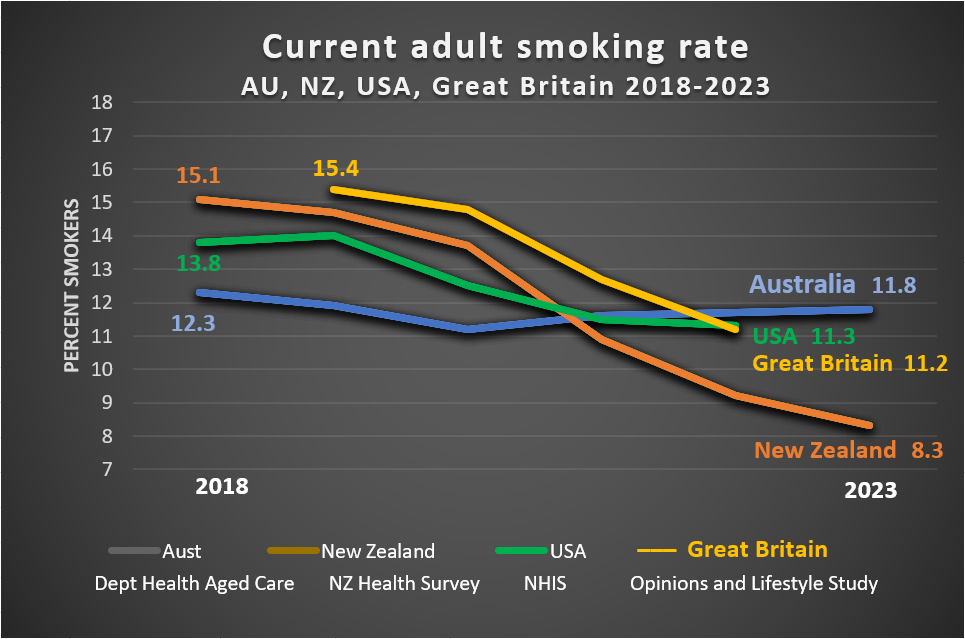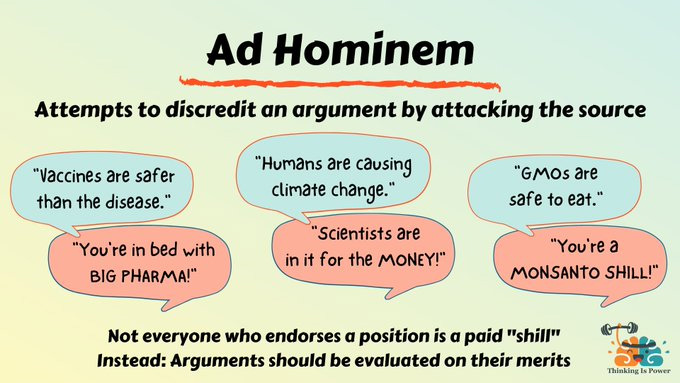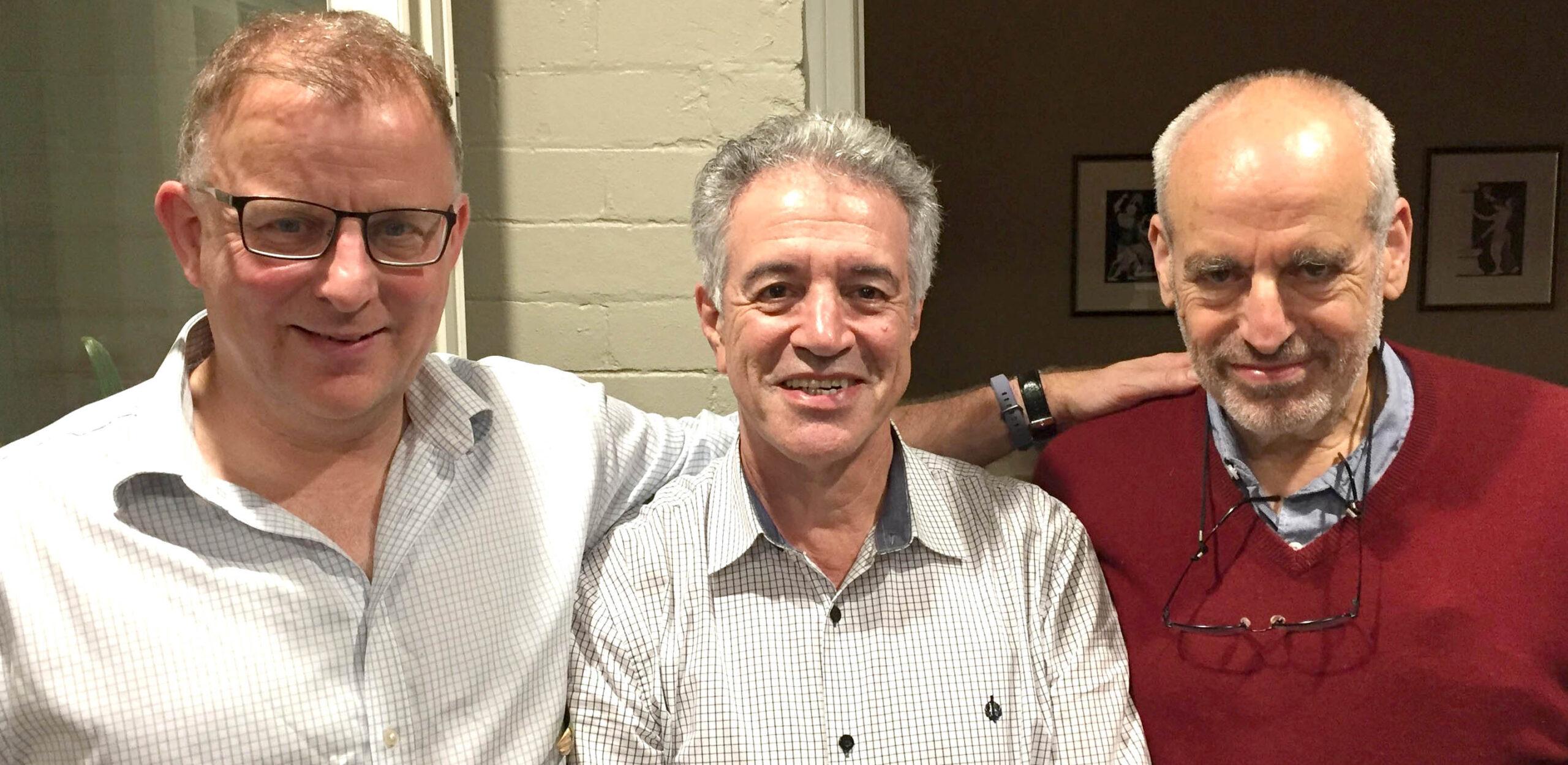
Farewell and adieu
Posted on December 27, 2023 By Colin
AFTER TEN YEARS OF ADVOCATING FOR VAPING for tobacco harm reduction, I am stepping away from the field and retiring. This is my last blog.
As a tobacco treatment expert, I was excited when vapes first arrived in Australia. Here at last was a quitting aid that not only delivered nicotine, but also replicated the behavioural and sensory aspects of smoking. And it worked. Many of my patients who had been unable to quit finally succeeded with vaping.
I went to the UK in 2014 and met with leading experts Clive Bates, Professor Peter Hajek and Martin Dockrell. I returned even more enthusiastic, and wrote an article in the Medical Journal of Australia about this exciting innovation and how it could improve public health.
However, in Australia, vaping has faced relentless, hostile opposition which has steadily increased as the scientific evidence has strengthened. Opposition has been characterised by a stubborn denial of the evidence, a campaign of fear, doubt and misinformation and vicious attacks on vaping supporters. It has been painful to watch.
The official narrative is further amplified uncritically by the mainstream media, which focuses on sensational and negative stories about vapes and exaggerates the risks. Positive reports on the benefits are rarely covered.
Some reflections on my journey may help understand Australia’s contrarian approach to vaping and the way forward.
Australia’s public health failure
Other Western countries like New Zealand, the UK and Canada have adopted a more supportive evidence-based stance on vaping and have seen unprecedented declines in smoking rates as a result.

Nowhere is this more evident than in Australia’s closest neighbour, New Zealand, that has very similar tobacco control laws.
The adult smoking rate (monthly or more) in New Zealand has declined by 45% from 15.1% to 8.3% in the last 5 years. During the same period, the smoking rate in Australia fell by a measly 5% from 12.3% to 11.8%
New Zealand’s extraordinary success is due largely to the legalisation and regulation of vaping in 2020 which has been the only major tobacco control intervention in the last 5 years (other than tax increases with inflation). Smoking rates in New Zealand are declining in line with rising vaping rates.
Another direct consequence of Australia’s current policy framework has been the creation of a rampant black market controlled by organised crime networks. An estimated 100 million vapes are imported illegally every year and freely sold without age restrictions or quality control. The black market has spiralled into violence, with increasing reports of fire-bombings, extortion and public executions as criminal groups vie for market share.
Denial of the scientific evidence
In Australia, opposition to vaping is not based on the scientific evidence. Governments and Tobacco Control groups reject vaping because of underlying (abstinence-only) ideology, political, financial and moral reasons and vested interests, amongst other things.
However, opponents can't use these unacceptable reasons publicly. Instead they favour an emotional "think of the children" defence.
Opponents have weaponised concerns about youth vaping into a moral panic, while discounting the huge public health opportunity for adult smokers
However, our recent Evidence Review found that these concerns are exaggerated and that youth vaping carries relatively minor health risk. Most vaping by young non-smokers is experimental and short-term, nicotine addiction is rare in non-smokers and the net effect of youth vaping at a population level is to displace smoking.
The Health Minister Mark Butler repeatedly resorts to scaremongering, disinformation and selective use of the evidence - for examples, see my blogs here, here, here and here.

Even Australia's peak health organisations distort and deny the evidence. In 2022, I led a review of the Position Paper on vaping by Australia’s leading health and research body, the National Health and Medical Research Council (NHMRC).
Our findings, authored by 11 leading Australian and international experts (including Professors Ann McNeill, John Britton, Neal Benowitz and Ron Borland) published in the journal Addiction, found that
The NHMRC’s assessment contained serious scientific flaws, misinformation and grounds for concerns about bias. We concluded that it “fails to meet the standard expected of a leading national scientific body”
Yet our review received little media attention and was dismissed by the NHMRC. Professor Matthew Peters, a member of the NHMRC E-Cigarette Working Group sent this insulting and unprofessional response to our email:
![]()
A further government-commissioned review from the Australian National University (ANU) in 2022 was equally flawed. Our rigorous peer-reviewed critique in Drug and Alcohol Review was ignored once again. We wrote to Professor Banks to request a meeting to discuss the report but she did not reply. The ANU report is regularly referenced today as the gold-standard guide for Australian policy.
Submissions by leading Australian experts to the Health Minister— here and here—and to the Chief Medical Officer, as well as our recent Evidence Review sent to all members of parliament, have been rejected.
Misinformation about vaping from tobacco control experts, health charities, state Health Departments and medical associations has been a daily occurrence.
Most Australian scientific journals such as the Medical Journal of Australia (MJA) and the Australian and New Zealand Journal of Public Health are hostile to vaping, and pro-vaping submissions are typically quickly rejected. On one occasion, I was only able to get a letter to the editor of the MJA published after an unprecedented eight revisions.
It is also notable that invitations to anti-vaping advocates such as Emeritus Professor Simon Chapman to debate the evidence have been repeatedly refused.
The personal cost of advocacy
My evidence-based advocacy and the efforts of others have been undermined with cowardly smears, ad hominem attacks and harassment.

I have never received funding from e-cigarette or tobacco companies and all my advocacy has been self-funded
However, I have frequently been falsely accused of receiving funding from Big Tobacco in national print media and on national radio, for example by Andrew Forrest here. Anti-vaping advocates have repeatedly tried to block my presentations, teaching and media articles.
An invitation to present the evidence for vaping at the Grand Rounds of a leading Sydney Hospital was withdrawn after a false claim by Professor Matthew Peters that I “was funded by a tobacco company,” despite this being thoroughly disproved.
Complaints about my advocacy have twice been made to the Health Care Complaints Commission. Both were dismissed.
Opponents attempted to have one of my peer-reviewed publications on vaping retracted from a leading journal on the basis of a fabricated conflict of interest. The retraction was only withdrawn after I engaged a lawyer and spent $10,000 on a legal challenge.
Channel 7’s Spotlight program claimed that I was a friend of Big Tobacco and implied that I was acting for them. Once again, I engaged a lawyer to challenge this attack on my integrity.
These repeated assaults have caused me intense aggravation and frustration. My support for tobacco harm reduction is undiminished. But I have had enough and it is time for younger advocates to step up and take on the fight.
The future
There is no question that vaping nicotine will become mainstream in Australia in time. All harm reduction strategies face hostile opposition initially, but invariably prevail, often after many years of pointless debate and delay (eg needle exchange programs, condoms to prevent HIV, seat belts and medically supervised injecting rooms). History also shows that disruptive innovations (eg electric cars and digital cameras) are almost always opposed initially but are ultimately successful.
The decision to endorse vaping is a political one and will be made by Members of Parliament. Alex Wodak and I have visited hundreds of MPs over the last few years and have written regular evidence updates for MPs.
Vapers should continue to write to their MPs and visit them in person wherever possible to tell their story, and to keep the pressure on (see here)
Market research surveys have shown that there is overwhelming public support for regulating vapes as adult consumer products like cigarettes. However, the message needs to be made loud and clear to MPs. Vapers should join the Australian Smoking Alternatives Consumer Association for a strong collective voice.
I am hoping other medical advocates will step up and take my role. I am more than happy to mentor anyone wishing to take the baton.
The key role of a medical advocate in my opinion is to present the best possible evidence to policymakers and the media, with the ultimate aim developing evidence-based policy
What is needed isn’t more or better science. There is abundant high quality evidence available now supporting vaping. We need to get past the smokescreen of ideology, politics, vested interests etc and have a frank and balanced debate about the actual scientific evidence.
My greatest concern from this toxic and dishonest debate is the reduced access to a proven lifesaving alternative for Australian smokers. The anti-vaping crusade will result in more preventable smoking-related deaths and illness and is morally unforgiveable. It has also undermined public trust in health authorities and government, and this will cause harm far beyond the vaping debate.
While we delay, Australian smokers are dying unnecessarily. The sooner Australia realigns public policy on vaping with the scientific evidence, the better. Hundreds of thousands of Australian lives depend on it.
Thanks
Vaping advocacy is a team sport. I want to give special thanks to my colleagues Dr Alex Wodak AM and Clive Bates for their invaluable support, without which my advocacy would have fizzled long ago.

Special thanks to Clive Bates and Alex Wodak AM
Thanks also to Brian Marlow and Legalise Vaping Australia and the many vapers and other advocates for their ongoing efforts.